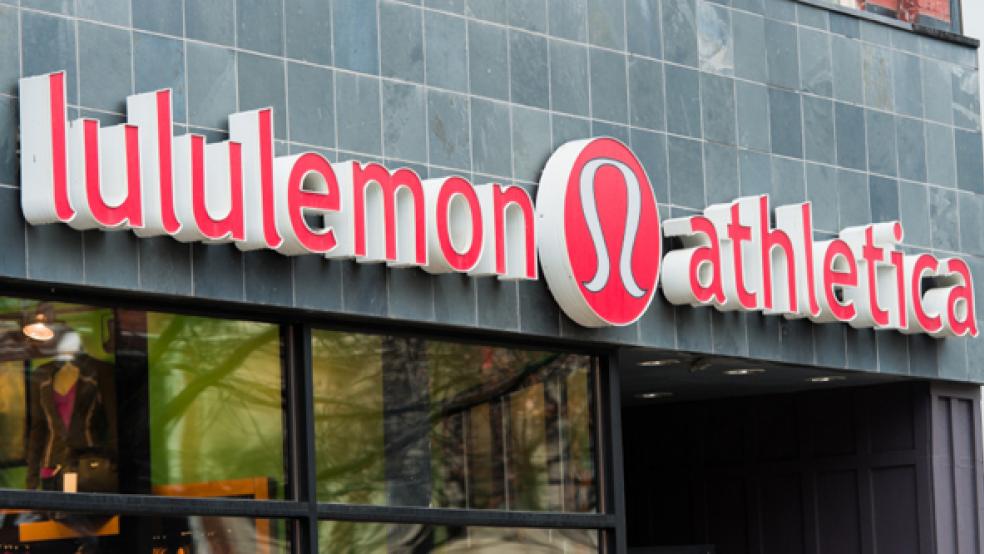Despite all the recent market turmoil and unease, investors have remained relatively confident that members of the ultra-affluent 1 percent would continue to remain willing to drop a few hundred dollars for a new pair of shoes, a scarf, a tie, all without turning a hair. Luxury retailers catering to this elite group have routinely trumped most of their rivals when it comes to posting higher profits or larger gains in same-store sales. Late last year, shoppers snapped up “fantasy gifts” offered by Neiman Marcus for the holidays, ranging from a $250,000 speedboat to a $395,000 Ferrari.
How can it be, therefore, that Lululemon Athletica’s (LULU) customers might start to balk at adding another $98 “Groove Pant” to their stash of yoga gear? Or paying $300 or so for another pair of Prada sunglasses? And yet to hear both of these purveyors of goods to the high-end market, that’s exactly the scenario that keeps their managers awake at nights. And now it’s starting to rattle their investors, as well.
Vancouver-based Lululemon’s stock had already begun to retreat from its recent high just north of $80 a share when the company announced yesterday that it is scaling back its estimates for both revenues and profits in the current second quarter, ending in July. Of course, those yoga pants – said to flatter their wearers’ posteriors – are still selling very well indeed: The company said its first-quarter profits jumped 40 percent to 32 cents a share, even better than it had forecast. But now Lululemon is taking a more wary view of the current quarter, cautioning investors that it may earn only about 28 to 30 cents a share; the consensus on the part of analysts had been closer to 33 cents a share.
The market reaction was dramatic. Investors looked straight past the results and focused intently on the lower second-quarter estimate. After plunging nearly 12 percent at one point in the pre-market trading session yesterday, Lululemon shares ended the day down 8.8 percent at $63.84. (They regained about 36 cents a share in after-hours trading.) That selloff came in spite of the fact that Lululemon actually raised its guidance for earnings for the 2012 fiscal year as a whole, to $1.55 to $1.60 a share from a previous range of $1.50 to $1.57 a share. The second-quarter warning left investors muttering to one another, wondering if the company was worried about the second quarter now when it wasn’t a few months ago what’s to say that won’t happen again in a few months with respect to the third and fourth quarters?
In an uncertain and volatile economic environment, owning a stock subject to high expectations whose fate is tied to consumer confidence requires a leap of faith. And with the Eurozone seemingly intent on coming apart at the seams, U.S. unemployment once again on the rise and the prospect of a double-dip recession rearing its head once more (not to mention the fact that Chinese authorities just cut key interest rates to ensure the country has a soft economic landing rather than the bumpy one global investors fret may be in store), investors may be pardoned for preferring to wait for evidence that a company like Lululemon – already trading at 50 times trailing 12-month earnings – can continue to deliver.
It’s all down to Europe and China. The former is a traditional hotspot for luxury retailers, and the place where many iconic luxury brands were born. China is the face of the future, offering a beacon of hope for luxury brands, such as Prada, which finally went public last year in Hong Kong. And yesterday Prada, too, combined its first-quarter earnings announcement – it had a blockbuster three months, with revenues soaring 48 percent from year-earlier levels and profits skyrocketing to €121.7 million, up from €57.7 million a year earlier – with some sobering words about its outlook. Prada’s roster of luxury brands must "be ready to take any necessary actions to … preserve (its) long-term growth strategy." What that means in practice remains unclear, but the message is anything but vague: Prada’s management team is concerned about the strength of the headwinds taking shape that might affect even high-net-worth investors.
Of course, it could also be that Lululemon and Prada are deliberately talking down investor expectations in hopes of delivering a massive positive earnings surprise in a few months. That’s what a number of companies did during the first quarter of 2012— indeed, a large enough proportion of S&P 500 members ended up posting positive “surprises” that the data appeared to show sudden improvement in results.
A polite phrase for this kind of activity is being “conservative” with guidance; a more forthright one is sandbagging investors. In the face of such massive anxiety on a global basis, perhaps under-promising and over-delivering is the way to go – but given the kind of volatile financial markets that we must negotiate today, it’s a dangerous strategy, one that may send investors rushing for the Pepto-Bismol and even throwing up their hands in despair and abandoning their stocks for Treasury securities. Perhaps not entirely rational – but who could blame them?



